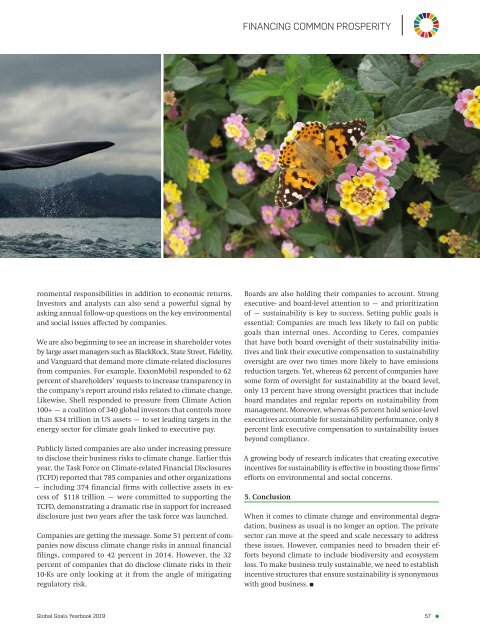Aliging Profit with Purpose - Global Goals Yearbook 2019
What are companies for? The rules for companies have changed. The focus is increasingly on their sustainable, social, and ecological impacts. The strategic orientation toward the so-called corporate purpose is decisive for profitable growth in the future. This currently results in a large number of questions for businesses: How do you find an inspiring and future-oriented corporate purpose, and how can it be aligned in such a way that it brings profitable growth and social responsibility in concert? The new 2019 edition of the Global Goals Yearbook offers answers to these crucial questions thanks to its consistent orientation toward the UN Sustainable Development Goals and a competent editorial board and author pool.
What are companies for? The rules for companies have changed. The focus is increasingly on their sustainable, social, and ecological impacts. The strategic orientation toward the so-called corporate purpose is decisive for profitable growth in the future.
This currently results in a large number of questions for businesses: How do you find an inspiring and future-oriented corporate purpose, and how can it be aligned in such a way that it brings profitable growth and social responsibility in concert? The new 2019 edition of the Global Goals Yearbook offers answers to these crucial questions thanks to its consistent orientation toward the UN Sustainable Development Goals and a competent editorial board and author pool.
Create successful ePaper yourself
Turn your PDF publications into a flip-book with our unique Google optimized e-Paper software.
FINANCING COMMON PROSPERITY<br />
ronmental responsibilities in addition to economic returns.<br />
Investors and analysts can also send a powerful signal by<br />
asking annual follow-up questions on the key environmental<br />
and social issues affected by companies.<br />
We are also beginning to see an increase in shareholder votes<br />
by large asset managers such as BlackRock, State Street, Fidelity,<br />
and Vanguard that demand more climate-related disclosures<br />
from companies. For example, ExxonMobil responded to 62<br />
percent of shareholders’ requests to increase transparency in<br />
the company’s report around risks related to climate change.<br />
Likewise, Shell responded to pressure from Climate Action<br />
100+ – a coalition of 340 global investors that controls more<br />
than $34 trillion in US assets – to set leading targets in the<br />
energy sector for climate goals linked to executive pay.<br />
Publicly listed companies are also under increasing pressure<br />
to disclose their business risks to climate change. Earlier this<br />
year, the Task Force on Climate-related Financial Disclosures<br />
(TCFD) reported that 785 companies and other organizations<br />
– including 374 financial firms <strong>with</strong> collective assets in excess<br />
of $118 trillion – were committed to supporting the<br />
TCFD, demonstrating a dramatic rise in support for increased<br />
disclosure just two years after the task force was launched.<br />
Companies are getting the message. Some 51 percent of companies<br />
now discuss climate change risks in annual financial<br />
filings, compared to 42 percent in 2014. However, the 32<br />
percent of companies that do disclose climate risks in their<br />
10-Ks are only looking at it from the angle of mitigating<br />
regulatory risk.<br />
Boards are also holding their companies to account. Strong<br />
executive- and board-level attention to – and prioritization<br />
of – sustainability is key to success. Setting public goals is<br />
essential: Companies are much less likely to fail on public<br />
goals than internal ones. According to Ceres, companies<br />
that have both board oversight of their sustainability initiatives<br />
and link their executive compensation to sustainability<br />
oversight are over two times more likely to have emissions<br />
reduction targets. Yet, whereas 62 percent of companies have<br />
some form of oversight for sustainability at the board level,<br />
only 13 percent have strong oversight practices that include<br />
board mandates and regular reports on sustainability from<br />
management. Moreover, whereas 65 percent hold senior-level<br />
executives accountable for sustainability performance, only 8<br />
percent link executive compensation to sustainability issues<br />
beyond compliance.<br />
A growing body of research indicates that creating executive<br />
incentives for sustainability is effective in boosting those firms’<br />
efforts on environmental and social concerns.<br />
5. Conclusion<br />
When it comes to climate change and environmental degradation,<br />
business as usual is no longer an option. The private<br />
sector can move at the speed and scale necessary to address<br />
these issues. However, companies need to broaden their efforts<br />
beyond climate to include biodiversity and ecosystem<br />
loss. To make business truly sustainable, we need to establish<br />
incentive structures that ensure sustainability is synonymous<br />
<strong>with</strong> good business.<br />
<strong>Global</strong> <strong>Goals</strong> <strong>Yearbook</strong> <strong>2019</strong><br />
57

















